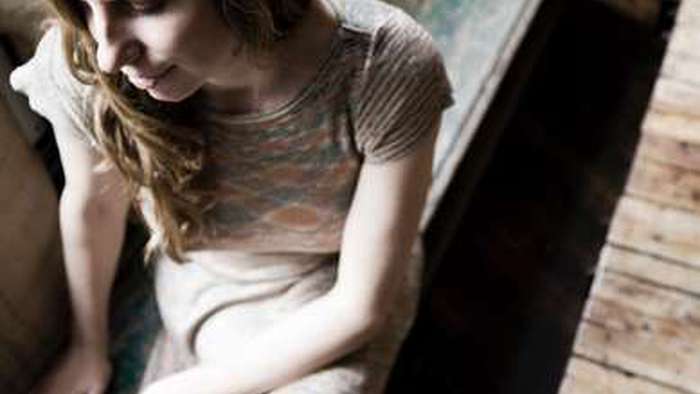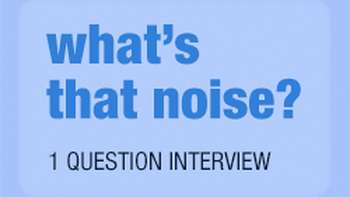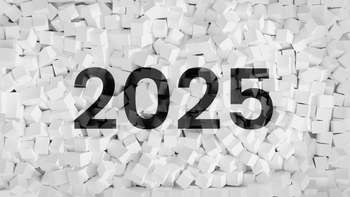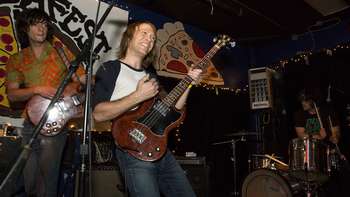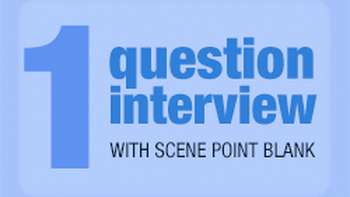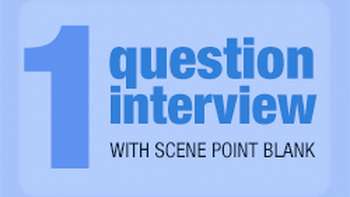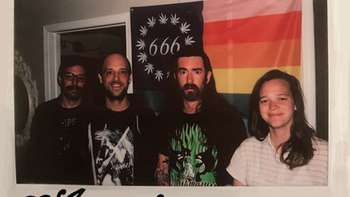Scene Point Blank: You also have Warren Ellis playing in the album.
Rebecca Foon: Yeah, so we wrote four of those tracks together, and he plays on four of them. All the instrumental tracks we co-wrote together.
Scene Point Blank: How did the two of you meet?
Rebecca Foon: We met at 2005 in Montreal at the Suoni [Per Il Popolo] festival and I was with The Mile-End Ladies String Auxiliary, with Sophie [Trudeau] from GY!BE and Genevieve Heistek from Hangedup. We were asked to do a collaboration with Warren Ellis, who came to Montreal for a week and we composed together and performed the music. We have been close friends since then.

At the concert I organized in Paris with Jesse, I had asked him and Nick [Cave] if they wanted to perform, but it did not happen due to many things. Then Flea [of Red Hot Chili Peppers] performed, playing at the festival with Thom Yorke and Patti Smith, but then asked if he could do a solo set. And then when we get to Paris, Flea said that his friend Warren was going to play and asked for a Fender Twin, and then I realized it was Warren Ellis.
I think those shows were pretty life changing for everyone involved, because it was after the Bataclan attacks and everyone still decided to do it. There was so much energy, because not only was it the Paris Agreement and anxiety around that, but also Bataclan. It was just so moving and the performances were incredible [you can check them out HERE].
Scene Point Blank: What would you say Warren brought to the album? Or was it something Warren helped you with compositionally?
Rebecca Foon: Warren was the only musician that I wanted to ask to perform and play on this album. The last had so many people appearing but, for this one, I thought the only person that I wanted was Warren. And it took me about three years to make this album—I thought of that before Paris even happened.
Then we started sending each other loops and it happened organically. I did not even ask if he wanted to play on the album, we just started working on music together, and then all of a sudden here there were four amazing tracks. In my heart it was planned but the actual process was not planned.
And we would love to perform it live, it is just a matter of having the opportunity and the time.
Scene Point Blank: How did you feel collaborating from such distance, you being in Canada and Warren in Australia? Did the separation become a problem?
Rebecca Foon: Maybe, but it was kind of nice also. It gave me space to see what I could really do with some of his stuff and not be too shy about it.
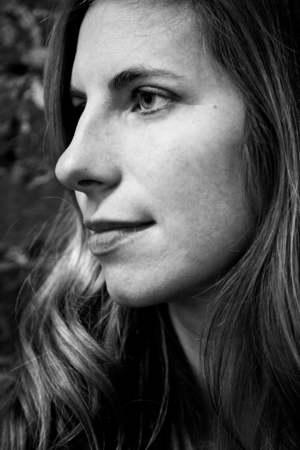 Scene Point Blank: In a past interview you did you mentioned that you wanted to give the listener a sense of hope in a world that is not pretty. Given what is going on right now with the Paris Agreement and the US pulling out, has your perspective remained the same?
Scene Point Blank: In a past interview you did you mentioned that you wanted to give the listener a sense of hope in a world that is not pretty. Given what is going on right now with the Paris Agreement and the US pulling out, has your perspective remained the same?
Rebecca Foon: I actually feel more hopeful and in a way. I think Trump is a catalyst for movement. What I like about the state of the world right now is that I feel that people are less apathetic and they are starting to realize more than ever that the time is now. For us to move towards the transition away from fossil fuels and into renewables, it has to happen really quickly and it takes everybody. There are big players that are making a big impact but the transition needs to come from communities. What I think is really cool is that gives people a big sense of hope. That is what I am really trying to advocate now within my activism work and with music, with Pathway to Paris.
What I believe in and what I am trying to communicate is that for us to meet the Paris Agreements and move beyond them— because we know they need to be more ambitious—and to stay within somewhat of a zone of climate safety on this planet—the one and only planet we know—we have a very limited time to make the transition. For that to happen cities and communities need to transition off of fossil fuels. Countries can do what they can but what it comes down to is the cities, and that is really cool. Imagining cities that are no longer dependent on fossil fuels, that is the world I want to live in and am excited to live in.
The fossil fuel world is so old school at this point, it feels kind of wrong driving a car that is polluting gas, or in airplane, trains or whatever it is, a bus. It feels so dated at this point; our philosophy and technology is beyond it and we just have to make that transition. Find the means, the plans and the infrastructure and the money to do it. And it is all there, it is just a matter of collaboration and doing it as efficiently and in a way as innovative as possible, that also can deal with other issues, like poverty or health issues.
Because it is all so connected. Obesity is connected to lack of walkability, and lack of walkability is connected to car culture and car culture is connected to fossil fuels. I really believe in this movement of cities creating plans to reduce the greenhouse gas emission to go towards 100% renewables by 2040.
Scene Point Blank: On one hand you have a positive change with certain states and governors still choosing to uphold the Paris Agreement, but on the negative side you also have a number of people that do not believe that all this is even happening and it is just a conspiracy theory.
Rebecca Foon: Yea, it is interesting. It is a really wacky world we live in. [Laughs]. The question is, exactly coming back to time, because there is only so much time we have now to make that transition, so we shall see if the technology and changes are fast enough and if cities come together fast enough to create plans and move these plans into actions, to make it so that we do not take more fossil fuels from the ground, because we know we do not longer have the capacity to take fossil fuels.
It is definitely a wacky time, and it is very much also an apocalyptic time and I think humanity is starting to become the language. For me, I am a positive thinker and there is a lot of cool stuff happening and if the world can make the transition, it is going to be a pretty cool world, and if it cannot, it cannot and it is really sad and the world will be OK without humans. It gets philosophical at this point, so if humanity cannot save itself: “OK fine.” [Laughs].
Scene Point Blank: It is like the George Carlin joke. You should not worry about the planet, the planet is going to be fine, it is humanity that you should be worried about.
Rebecca Foon: And if humanity with all the tools that we have at our toolbox (intelligent brains, technology, skills and wealth), if we cannot get it together then it just not meant to be. [Laughs]. But if we can it will be pretty cool.
Scene Point Blank: Regarding the title of the album, just because the moment I saw it I immediately thought of Al Gore's film An Inconvenient Truth. Do you feel that we have moved from the point of climate change being an inconvenient truth to it being a common truth?
Rebecca Foon: Yes, it is like our truth. Every human being's truth on planet Earth, because every human is affected by climate change. Whether you are rich, poor, black or white, it is a common factor. It is like water: everyone needs water, everyone needs clean air, everyone needs food, everyone needs shelter and everyone needs a climate safe world.
Scene Point Blank: What is the news from the Pathway to Paris? Are you still active?
Rebecca Foon: Yes, we are still active and we are still working on some big things. We are keeping the name, and it is very much about turning the Paris Agreement into action. So everything we do is around that focus. So there will be some fun, exciting stuff to be announced soon.
